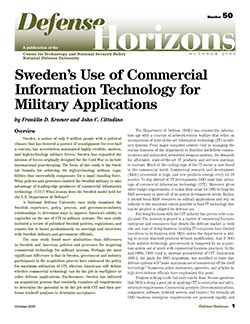DOWNLOAD PDF
 Overview
Overview
Sweden, a nation of only 9 million people with a political climate that has fostered a posture of nonalignment for over half a century, has nevertheless maintained highly credible, modern, and high-technology military forces. Sweden has expanded the mission of forces originally designed for the Cold War to include international peacekeeping. The focus of this study is the Swedish formula for achieving the high-technology military capabilities that successfully compensate for a small standing force. What policies and processes enabled the Swedish military to take advantage of leading-edge producers of commercial information technology (CIT)? What lessons does the Swedish model hold for the U.S. Department of Defense?
A National Defense University case study examined the Swedish experience, policy, process, and government-industry relationships to determine ways to improve America’s ability to capitalize on the use of CIT in military systems. The case study included a review of published Swedish policies, regulations, and reports but is based predominantly on meetings and interviews with Swedish industry and government officials.
The case study found more similarities than differences in Swedish and American policies and processes for acquiring commercial technology for military systems. Perhaps the most significant difference is that in Sweden, government and industry participants in the acquisition process have embraced the policy for maximum utilization of CIT, whereas Americans still debate whether commercial technology can do the job in warfighter or other defense applications. Furthermore, Sweden has initiated an acquisition process that routinely examines all requirements to determine the potential to do the job with CIT and then performs tradeoff analyses to determine acceptance.
READ MORE >>